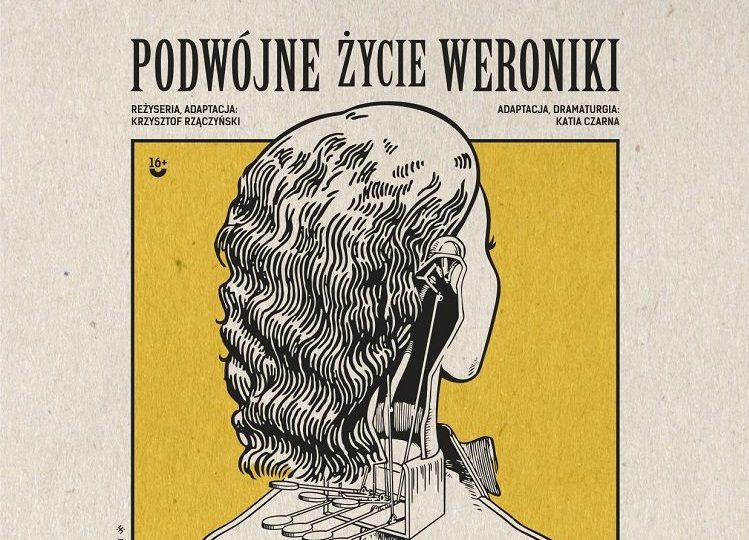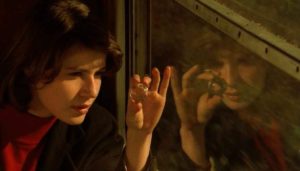
The Double Life Of Véronique (1991)
“Maybe it is worth investigating the unknown, if only because the very feeling of not knowing is a painful one.”
Krzysztof Kieślowski
Some films are completely blissful and ethereal, their souls float through the environment, their images fade between dreamy and fleeting sensations, their substance is destined to overcome the borders of time and space. There are some films that, no matter how often they are seen, always leave a new flavor that penetrates your emotional depths. The Double life of Véronique by Krzysztof Kieślowski is one of them. It might also be the one that reflects best the sensitive, metaphysical and poetic spirit of the Polish auteur. Sublime works like Decalogue (1998) and The Three Colour Trilogy (1993-1994) show us that Kieślowski has always been interested in the inner truth of man and his longing for freedom, an intimate terrain he approaches with surgical delicacy and sensitivity. In The Double life of Véronique, life is represented as a strange result of freedom and coincidences. A big confluence of multiple factors create an individual feeling which is fueled by the complex crossroads that life presents us.
The Double Life Of Véronique intertwines the lives of two physically identical women (both played by Irène Jacob). They are motherless, lonely and deep music lovers that share the same heart disease but are otherwise opposite personalities. Weronika lives in Poland and has a brilliant career as a soprano singer. In France, more than a thousand kilometers away, lives Véronique, a music teacher who shares many vital similarities with Weronika. Weronika gives herself to music as her only goal in life, while Véronique gives herself to love in all aspects and forms. This is the clearest difference between the two women. It seems as if both were similar in body and soul, despite having different life strategies and goals. Without knowing anything about each other or maintaining any kind of relationship, they seem to be connected. Both women represent the myth of the doppelgänger, which says that every living being has, somewhere, a double of identical appearance and opposite personality.
soprano singer. In France, more than a thousand kilometers away, lives Véronique, a music teacher who shares many vital similarities with Weronika. Weronika gives herself to music as her only goal in life, while Véronique gives herself to love in all aspects and forms. This is the clearest difference between the two women. It seems as if both were similar in body and soul, despite having different life strategies and goals. Without knowing anything about each other or maintaining any kind of relationship, they seem to be connected. Both women represent the myth of the doppelgänger, which says that every living being has, somewhere, a double of identical appearance and opposite personality.
Weronika tells others about a strange and uneasy feeling that constantly haunts her. This sensation is reinforced when she catches a glimpse of a French tourist (Véronique) taking photos of protestors in the center of Kraków, Poland. Afterwards, Weronika’s astonishing singing voice enables her to win a competition to join a musical company. As she begins to perform her first concert, the heart disease sadly prevents her from continuing and the film quickly shifts the attention to Véronique.
As we first see Véronique, she is in the middle of making love but suddenly breaks into tears with no explanation. This incident occurs in the very same moment when Weronika suffers a heart attack at her concert in Kraków. We soon learn that Véronique has given up a promising singing career because it seems “wrong for her”, and that’s why she decided to become a music teacher of young children. During this same period, she schedules an electrocardiogram, as if she has had some kind of warning, an unexplained sense of loss. Suddenly, she receives enigmatic packages in the mail from Alexandre (Philippe Volter), a puppeteer and children’s book author who gives a performance at the school where Véronique teaches. He sends Véronique a cassette tape that contains a fragment of Zbigniew Preisner‘s Van Den Budenmayer Concerto In Mi Mineur Version De 1798 (Sbi 152), the ethereal choir that her Polish doppelgänger interpreted when she suffered her heart attack. Alexandre’s goal is to help Véronique on her journey to know herself better. We will never know how Alexandre got that tape, in the same way that we won’t find an explanation for Véronique’s enigmatic and transcendent connection to another person.
At one point, Véronique says, “All my life I’ve felt like I was here and somewhere else at the same time”. Life works this way for many people. We see the ideal self and what we could be fully capable of doing, and then we are drawn back into the reality of where we actually are. The confusion and sadness of not knowing yourself can be seen in both women’s stories, and the joy in discovering something new has an equally powerful impact. Some people would see a depiction of what Jung called synchronicity, which refers to two different but identical phenomena, connected not only by its properties but also its inherent meaning. Others would call it apophenia, which is the tendency to perceive meaningful connections between unrelated things. Many would at least see an incredibly enigmatic and beautiful film, which is the least one can say. Kieślowski worked closely with the photographer Slawomir Idziak, the screenwriter Krzysztof Piesiewicz and the composer Zbigniew Preisner. They created a cinematic web of melancholy where stinging, drawn-out emotions symphonically turned into dramatic heart attacks.
by Octavio Carbajal González

Happy New Year, Shawn!.
Thanks for the kind words and feedback, great to see you around here. Hope you’re doing well, looking forward to your return on VW.
I know, VW has started 2021 with amazing surprises (Saliha’s “Manson” article is remarkable). The Double Life Of Véronique is a journey through unreal and dreamlike crossroads… A monument to beauty, synchronicity and music. I’m simply fascinated by the mysterious connections and coincidences between some people. It makes me think that we’re part of something bigger (yet unknown).
I also miss the whole experience in theaters, can’t wait to get back with any restrictions.
Hi Octavio, great review. KK really is one of the all time masters for me. Veronique is probably my favourite of his films, second only to the Dekalog. It’s mystical quality really resonates with me, and the can’t-put-your-finger-on-it tone puts it above Bleu. Another more surrealist Polish filmmaker that elicits that similar mysticism purely from tone is Wojciech Has. His film Hourglass Sanatorium gave me that similar sense of wonder with its protagonist travelling through a huge series of elaborate dream like spaces. Check it out, it’s madness!
Hey Max, thanks for reading! Kieślowski’s cinema is filled with details and symbolisms. Inside his stories, there’s always something new that I hadn’t noticed before.
I just researched the bio of Wojciech Has, thanks for the recommendation!
Hi Octavio. I’m happy that you chose ”The Double Life Of Véronique” for the year’s first review. It’s always a pleasure to read your thoughts – fantastic review. I have seen this film countless times and still there are new layers to discover. Irène Jacob said in interview that Kieślowski made 15 different versions from the film.
I really like the how Kieślowski and Sławomir Idziak use the soft light with yellow and green filtering, it fits perfecty to the ambience and theme of the film. Preisner’s music, as you know, is awsome. At the time nobody wanted to release the soundtrack. I’m glad they finally did.
Hey Mika !. I’m glad to see you here, thanks for the lovely words & thoughts about the film.
I really liked the analogies that you mentioned in your post: Lynch-Badalamenti and Herzog-Popol Vuh. What a perfect way to describe the connection between Kieślowski and Preisner!.
I also read about the 15 different versions, it was an audacious idea and a highly ambitious task. Unfortunately, it didn’t happen.
Agree with you on the color palettes and music, the whole setting was executed perfectly. Enjoy your copy of the soundtrack, hope I can find one soon !.
Welcome back Octavio,
I must admit I have not seen this one. Only Decalogue and Colors Blue.
But after reading your great review and watching the trailer here (visually stunning), it is definitely on my list of must see movies. Thank you for providing a pleasurable read once again!
Thank you for reading, Sergio !.
This is an incredibly poetic work that questions the unexplainable connection that some people share. I’ve always been fascinated by the concepts that surround “duality”.
As you can imagine, this is my favorite Kieślowski film. Highly recommended !
Magical film and review. It’s time to rewatch it
Thanks Adriana. Enjoy it !
Love this film! Kieślowski: “This film is about sensitivity and premonitions and relationships that are difficult to determine and irrational.”
The director is finding the right balance between the obvious and the mysterious. An enigmatic film about great emotions and love, but also about the power and beauty of music.
Happy that you’re back
Thank you for reading, Cem!.
I agree on those thoughts. Many times we try very hard to define the specific feeling or emotions that the author is trying to transmit. I’ve always been fascinated with the concept of “synchronicity”. If you think about it for a moment, we make very powerful connections with other people, and many times we don’t expect them. I really liked your last sentences.
See you around here!
Octavio,
Fantastic review of this film–my favorite foreign film of the 1990s. Double Life of Veronique is Kieslowski’s masterpiece. Irene Jacob’s performance is deeply poignant. Preisner’s music is haunting. Slawomir Idziak’s autumnal cinematography is shimmering and stunning.
Hey Mark!
Thank you for taking the time to read, I knew you would be interested in this particular film.
Kieślowski did a remarkable job, the cluster of emotions is really passionate and colorful. As you said, each character succeeded in his/her specific role for the film. Direction, performances, music and cinematography came together as one.
Really amazing review of one of my favourite films and soundtracks of all time!I Thank you!!
I love getting newsletters from you again
We’re glad to be back, Paula
Really amazing review of one of my favourite films and soundtracks of all times!
Thanks for reading, Christos.
Hi Octavio, good to see you and all back here on VW! Looking forward to a good third year on here!
I am just familiar with Kieslowski’s Dekalog, where he filmed the 10 commandments, and haven’t seen Véronique yet, but I will certainly do so soon. What’s interesting is that he used the music of the great Zbigniew Preisner in the film. “The Tree of Life” by Terrence Malick comes to mind, where he used Preisner’s “Lacrimosa” in a stunning scene. Both directors, Malick and Kieslowski, created excellent religious arthouse cinema, which I find to be quite interesting, almost subversive. Preisner was just the link here.
Anyway, I digress. Great review, a pleasure to read- I am looking forward to watch this film!